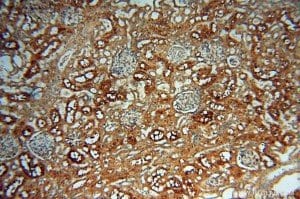 Doctors and scientists have long known that people with Type 2 diabetes are at an increased risk of developing certain types of cancer. Until recently, the mechanisms behind the link between the two diseases have been unclear to medical professionals.
Doctors and scientists have long known that people with Type 2 diabetes are at an increased risk of developing certain types of cancer. Until recently, the mechanisms behind the link between the two diseases have been unclear to medical professionals.
However, the mystery may finally be solved: researchers with the Harvard Medical School have reported that variations in levels of two different proteins are present in both diabetics and cancer patients. The findings were reported in the journal “Cell.”
The study demonstrated that mice who were engineered to have increased levels of the proteins Lin28a and Lin28b had a lower chance of developing diabetes when they were fed a high-fat diet. In contract, mice who are fed the same diet with those proteins functioning at normal levels are apt to become obese and develop Type 2 diabetes. The two proteins have also been proven to be related to an individual’s risk of developing some types of cancer, underscoring a relationship between cancer and diabetes in the activity of these two proteins.
“This highlights the overlap in the biology of these disorders,” says George Daley, M.D., Ph.D., a researcher who was involved with the study. Daley is also director of Stem Cell Transplantation and head of the Stem Cell Research Program at Children’s Hospital Boston. “It may be the same kinds of metabolic shifts that allow cancer cells to grow are also related to [whole-body] glucose metabolism.” Cancer and diabetes appear to both be caused by certain metabolic processes that may be signified by elevated levels of the two proteins.
“The results were startling,” says Daley. “Previously we had considered these molecules only as regulators of cell growth and cancer. But in these mice we discovered remarkable effects on sugar processing and diabetes.”
Daley commented that these findings have provided scientists with a molecular pathway related to diabetes and cancer that could be used in reducing the risk of those diseases. With new knowledge of the pathway in hand, scientists may be able to develop medications that target the processes and lower the risk of developing diabetes and cancer.
In addition, the findings of the study demonstrate that elevated blood sugar levels associated with diabetes are not the cause of higher rates of cancer, as was once hypothesized. This knowledge allows scientists to focus their research in other directions that may prove more fruitful. Researchers have already conducted many investigations on the link between high blood sugar levels and complications related to diabetes.
While diabetes is associated with an elevated risk of various types of cancer, it’s likely that the link between diabetes and pancreatic cancer is the most-researched one. Since the two diseases affect the same organ, it can be difficult to understand the causes and effects of one disease independently of the other. Other types of cancer that commonly follow diabetes include colorectal, prostate, endometrial, breast, liver, renal cell, and non-Hodgkin’s lymphoma. Previous research commonly stated that the strongest link between diabetes and cancer was probably elevated insulin levels, which cause Type 2 diabetes and which are believed to also promote growth of tumors.
While further research is required before scientists can fully understand the link between the two diseases, previous research has made it clear that diabetes typically precedes cancer, not the other way around.